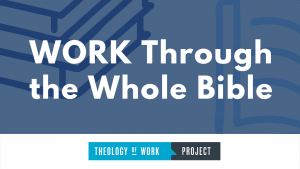
Scripture Reading: Ezekiel 18:5–9
Ezekiel 18:5-9 notes a range of actions, both righteous and wicked. These actions become the principles by which a person is said to “live” or “die.” Four of these actions are related to work: restoring a debtor’s pledge, providing for the poor, not charging excessive interest, and working justly.
Ezekiel 18 is more than a set of rules for living in exile; it is an answer to the despair the exiles feel. In response to the exiles’ question — “If we are God’s people, why are we in exile?” “Why are we suffering?” “Does God care?” — the Lord rebuts not with an answer, but with a call to live justly in the time between past transgression and future restoration, between promise and fulfillment, between question and answer.
Living out this personal righteousness in our professional pursuits adds life and meaning to our present circumstances because it assumes a better tomorrow, ushers the future kingdom of God into the present, and provides a glimpse of what God anticipates from his people as a whole. God rewards such behavior, the type of which is possible only by means of new hearts and spirits.
Prayer: Jesus, put a new heart and a right spirit within me, that I might live justly. Amen.
For Further Exploration: Read Israel’s Responsibility for its Predicament (Ezekiel 18) from the Theology of Work Bible Commentary.
Author: Theology of Work Project
Theology of Work Project Online Materials by Theology of Work Project, Inc. is licensed under a Creative Commons Attribution-NonCommercial 4.0 International License. Based on a work at www.theologyofwork.org
You are free to share (to copy, distribute and transmit the work), and remix (to adapt the work) for non-commercial use only, under the condition that you must attribute the work to the Theology of Work Project, Inc., but not in any way that suggests that it endorses you or your use of the work.
© 2014 by the Theology of Work Project, Inc.
Unless otherwise noted, the Scripture quotations contained herein are from the New Revised Standard Version Bible, Copyright © 1989, Division of Christian Education of the National Council of the Churches of Christ in the U.S.A., and are used by permission. All rights reserved.
